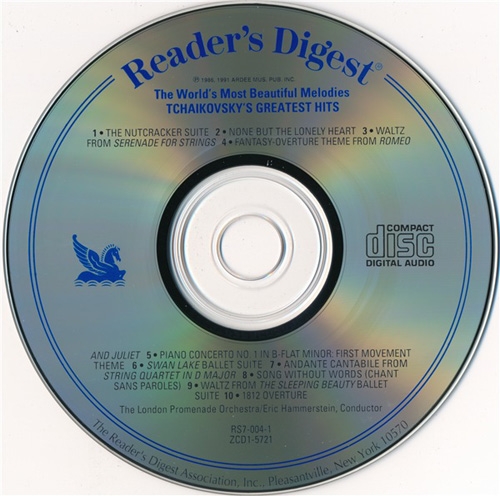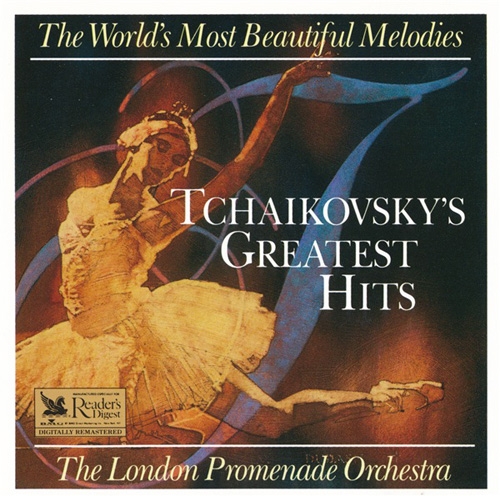
The London Promenade Orchestra - Tchaikovsky's Greatest Hits (The World's Most Beautiful Melodies) (1992) WAV|PCM / MP3
BAND/ARTIST: The London Promenade Orchestra
- Title: Tchaikovsky's Greatest Hits (The World's Most Beautiful Melodies)
- Year Of Release: 1992
- Label: Reader's Digest
- Genre: Instrumental, Classical Music
- Quality: Mp3 320 kbit/s / .WAV|PCM (tracks,scans)
- Total Time: 71 min
- Total Size: 183/884MB
- WebSite: Album Preview

Tracklist:
1. The Nutcracker Suite, Op. 71
2. None But The Lonely Heart
3. Waltz From 'Serenade For Strings'
4. Fantasy - Overture Theme From 'Romeo & Juliet'
5. Piano Concerto No. 1 In B Flat: Minor First Movement Theme
6. Swan Lake Ballet Suite
7. Andante Cantabile From 'String Quartet No. 1 In D Major'
8. Song Without Words (Chant Sans Paroles)
9. Waltz From 'Sleeping Beauty' Ballet Suite
10. 1812 -- Festival Overture, for orchestra in E flat major, Op. 49
Tchaikovsky, was a Russian composer of the romantic period, some of whose works are among the most popular music in the classical repertoire. He was the first Russian composer whose music made a lasting impression internationally, bolstered by his appearances as a guest conductor in Europe and the United States. He was honored in 1884 by Emperor Alexander III, and awarded a lifetime pension. Although musically precocious, Tchaikovsky was educated for a career as a civil servant. There was scant opportunity for a musical career in Russia at that time and no system of public music education. When an opportunity for such an education arose, he entered the nascent Saint Petersburg Conservatory, from which he graduated in 1865. The formal Western-oriented teaching he received there set him apart from composers of the contemporary nationalist movement embodied by the Russian composers of The Five, with whom his professional relationship was mixed. Tchaikovsky's training set him on a path to reconcile what he had learned with the native musical practices to which he had been exposed from childhood. From this reconciliation he forged a personal but unmistakably Russian style—a task that did not prove easy. The principles that governed melody, harmony and other fundamentals of Russian music ran completely counter to those that governed Western European music; this seemed to defeat the potential for using Russian music in large-scale Western composition or for forming a composite style, and it caused personal antipathies that dented Tchaikovsky's self-confidence. Russian culture exhibited a split personality, with its native and adopted elements having drifted apart increasingly since the time of Peter the Great. This resulted in uncertainty among the intelligentsia about the country's national identity—an ambiguity mirrored in Tchaikovsky's career.
Classical | Instrumental | FLAC / APE | Mp3
As a ISRA.CLOUD's PREMIUM member you will have the following benefits:
- Unlimited high speed downloads
- Download directly without waiting time
- Unlimited parallel downloads
- Support for download accelerators
- No advertising
- Resume broken downloads


